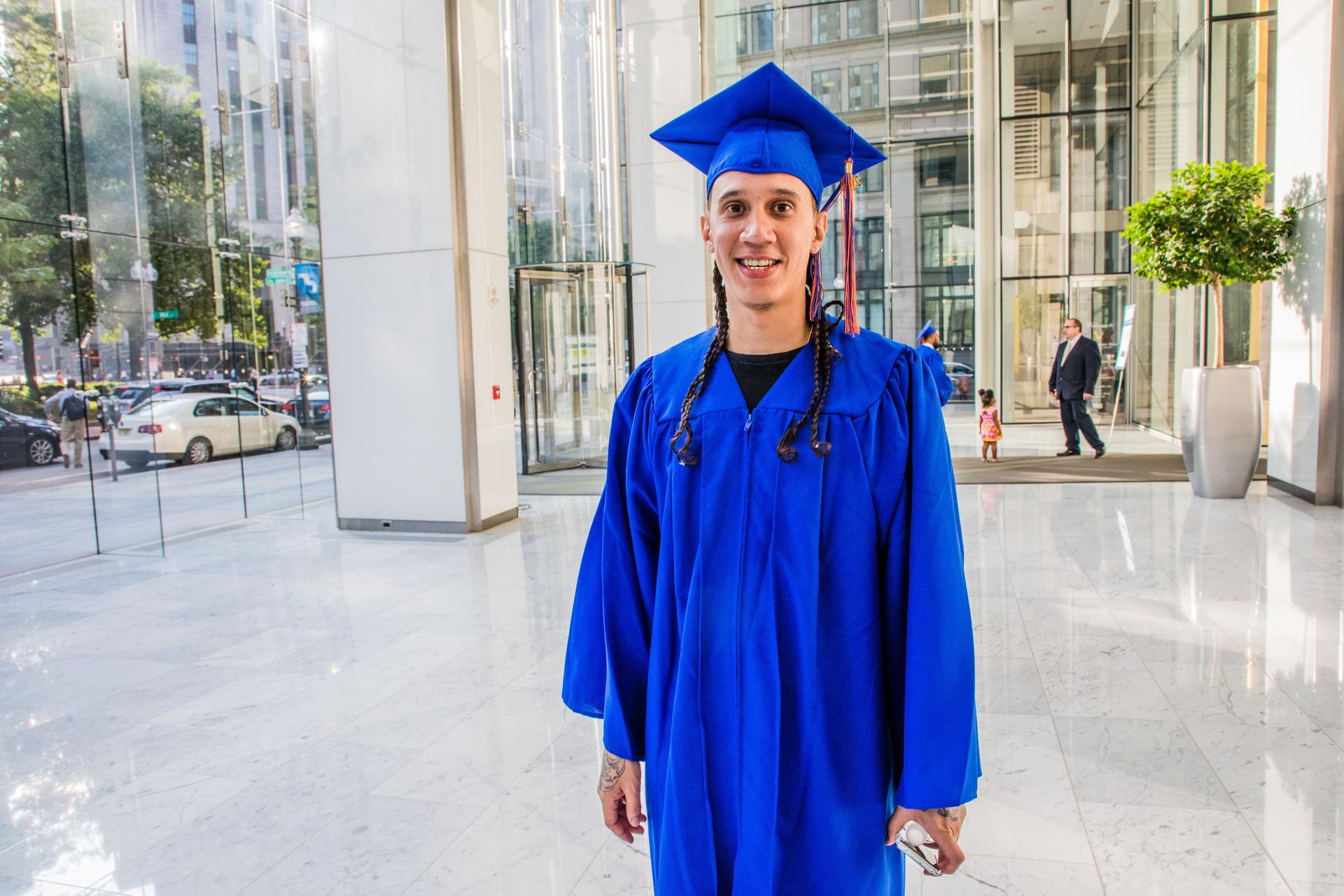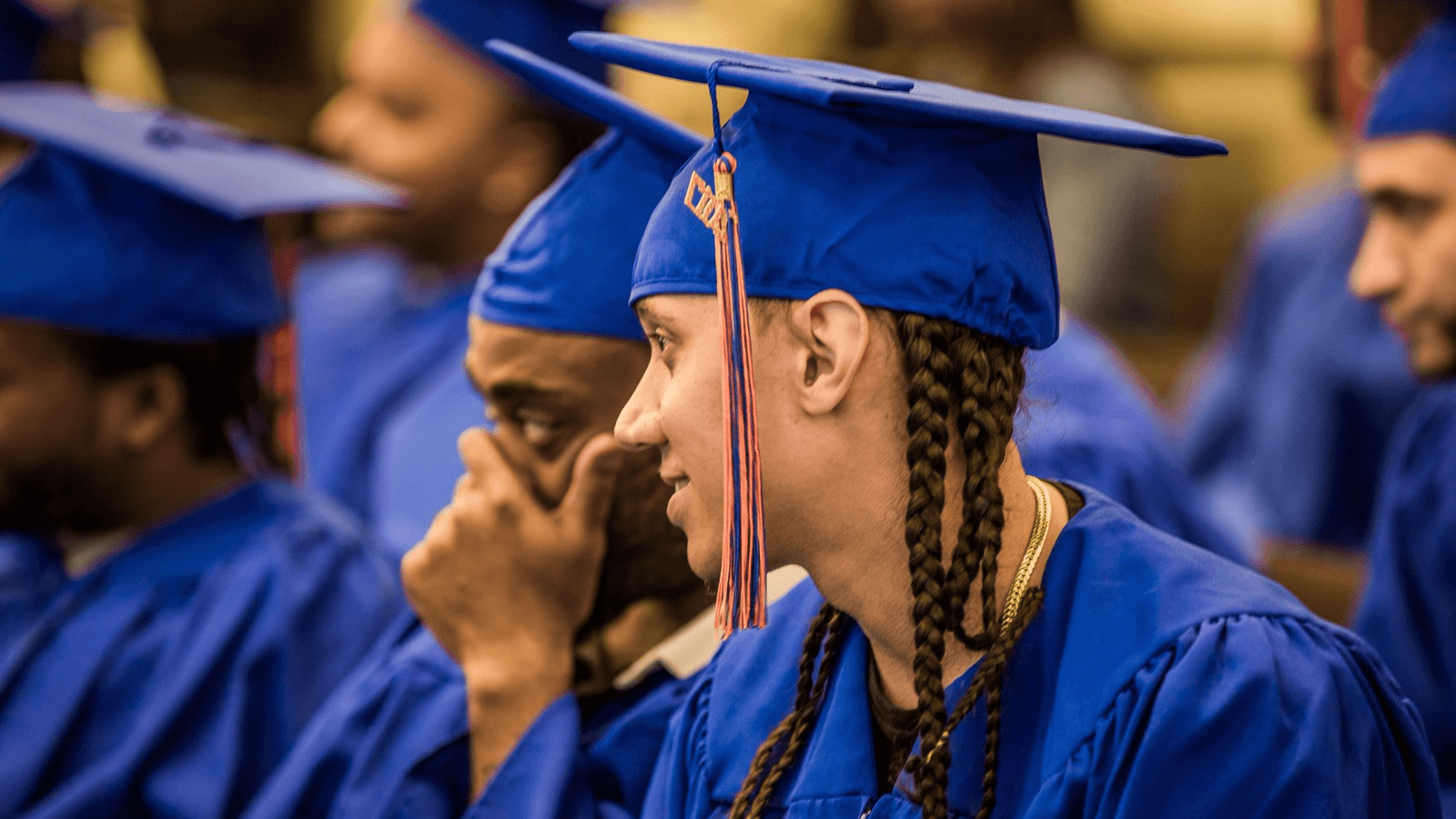The road from prison to college is a hard one. Here’s how this new high school graduate made it.
Alex Diaz at a College Bound Dorchester graduation ceremony on Aug. 24, 2017.
Almost two years ago, The Takeaway brought listeners the story of Alex Diaz, a high school dropout, former gang member and convicted felon who had his sights firmly fixed on going to college. Diaz told us that merely starting out on the pathway towards college was a struggle because of his troubled past, which required him to challenge others' low expectations.
“A lot of people see you as like, you’re not going to go nowhere. You’re not going to get a job or even go back to school,” he said. “I even felt like that at one time for hearing it so much, [but] I just had to overcome everybody’s opinions and everybody’s thoughts.”
Here, Elizabeth Ross, a Takeaway producer based at Boston public radio station WGBH, reports that Diaz’s dreams of getting to college were recently realized, thanks to a lot of hard work and the ongoing support of an educational nonprofit based in Boston called College Bound Dorchester.

Down in a brightly lit basement classroom, a small group of students is learning the ins and out of residential electrical wiring. Alex Diaz is among those listening intently during class here at the Benjamin Franklin Institute of Technology.
“Just me sitting right here in college, I feel different,” he says. “I feel like I never actually committed [any] crimes, so it feels good.”
This college classroom is a world away from the life Diaz once knew when he dropped out of high school and joined a gang. That life led to Diaz serving eight years in prison for armed robbery.
Now Diaz, 31, is pursuing a certificate in practical electricity at Benjamin Franklin. He hopes to eventually get an associate’s degree in automotive or electrical technology, but he says that even getting this far has been difficult.
“You know, I did a lot of stuff. I know people that don’t like me. The cops around, they still think you’re still doing the same old stuff and not realizing what you’re really doing, but at the end of the day I don’t let it get to me no more,” Diaz explains. “I just move forward and do what I got to do and one day, sooner or later, they’ll understand what I’m really doing.”
When I first met Diaz, nearly two years ago, he was working with College Bound Dorchester to obtain the equivalent of a high school diploma. The Boston nonprofit recently made that process a bit easier for Diaz and other former gang members and convicted felons by paying them to go to college. Students who qualify get $400 a week, or more than $20,000 a year.
“They pay us to go to school and that helps us with our bills and kind of helps to motivate us to go to school the next day and not focus on the streets,” he says. “It helps us support our families, like my daughter who is 11-years-old.”
College Bound Dorchester founder and CEO, Mark Culliton, thinks it is well worth it. Massachusetts spends more than $55,000 a year to house a single prison inmate. Culliton explains that his nonprofit targets the toughest youth from the most dangerous hotspots in Boston, and they are not always successful.
“We’ve had students shot and killed [and] we’ve had students that couldn’t stick with the program and made bad choices and got arrested,” Culliton says. “We even had a staff member that was shot in their line of work, but this is the nature of the world that these guys live in.”
College Bound Dorchester says it has seen a 71 percent reduction in recidivism among its students, and 150 of them are currently in college. The program, however, does not want to just transform its students’ lives.
When it comes to measuring the nonprofit’s success, Mandy Savitz-Romer, a professor at the Harvard Graduate School of Education says, “You have to look at community markers. This is not going to just benefit Alex [Diaz]. This is going to benefit Alex’s family, his children, now or one day,” she said. “It’s going to benefit the other young adults around Alex who see him and are inspired by what’s he’s done or feel permission to follow in his footsteps.”
Diaz’s older sister, Aixa, has already been inspired to follow in his footsteps. At 33, she says she is also keen to get her high school diploma, too.
“I’m a certified nurse assistant [and] I’m licensed for that, without a high school diploma,” she says. “I feel that with the high school diploma, I can succeed way more and make my brothers and sisters proud of me, too.”
Diaz’s sister looked after his daughter while he was in prison. Over the summer, she was among the many families cheering on him and all the students at a College Bound Dorchester graduation ceremony.
As for Diaz, he says there is a lot that keeps him motivated to stay in college, and it is not just because he is being paid to go there.
“I think about going back to jail. I think about if I just decide not to go to school for a week, there’s going to be something that can happen that’s bad,” he says. “I can’t afford to go back to prison. I’m considered almost a three-strikes. [For] anything I go back.”
Diaz insists that these days, his focus is firmly fixed on his future, going to school and his daughter who is one of the many looking up to him now and willing him on to succeed.
Editor's note: A previous version of this story stated that Alex Diaz had graduated from college. He has recently graduated from high school and is currently attending college. We have updated the headline and teaser for clarity.
A version of this story originally appeared on The Takeaway.
Our coverage reaches millions each week, but only a small fraction of listeners contribute to sustain our program. We still need 224 more people to donate $100 or $10/monthly to unlock our $67,000 match. Will you help us get there today?
